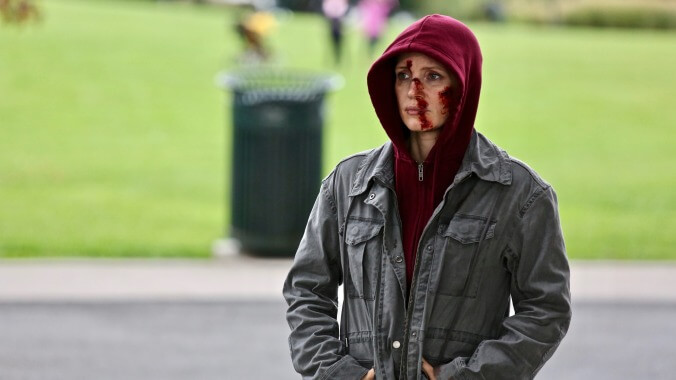Jessica Chastain sticks to her guns in the tired assassin thriller Ava


Note: The writer of this review watched Ava from home on a digital screener. Before making the decision to see it—or any other film—in a movie theater, please consider the health risks involved. Here’s an interview on the matter with scientific experts.
When cable TV goes the way of the laserdisc, movies like Ava will find their lifespans significantly shortened. Sure, there’s always Netflix, or Redbox, or watching a movie on a plane. But some films, particularly forgettable and generic action-thrillers, are basically made to run every Saturday afternoon on TNT. Directed by Tate Taylor, Ava is a napping-on-the-couch movie through and through, with recognizable names and a sexy premise but no distinct personality.
The film reunites Taylor with Jessica Chastain, who co-starred in his 2011 awards darling The Help. Since then, the director’s settled in to a journeyman groove helming middlebrow Hollywood potboilers like The Girl On The Train
and Ma. Meanwhile, Chastain’s etched out a power-femme niche of her own in dramas like Miss Sloane and Molly’s Game. Ava combines these two career diections, taking elements of the most popular assassin thrillers from the past five years and combining them with a signature Chastain role: a troubled but principled overachiever who uses cutting intelligence and stubborn determination to succeed as a glamorous woman in a violent man’s world.
Said glamorous woman be the title character, an ex-addict now working as an assassin for a vaguely defined “company” that has neither the menace of Killing Eve’s The Twelve nor the style of John Wick’s High Table, although the movie lifts elements from both. The former is reflected in the character of Duke (John Malkovich), Ava’s paternalistic “handler” (think: Killing Eve’s Konstantin) who advocates on her behalf to “company” higher-up Simon (Colin Farrell) and his daughter/protege Camille (Diana Silvers). Under Duke’s protection, Ava has been able to get away with the moralistic quirk of asking her targets to confess their sins in the moments before she kills them. (Why this is a problem if she still finishes the job is unclear, but Simon doesn’t like it.) But when an overseas assignment goes spectacularly—but not quite John Wick spectacularly—wrong, even Duke can’t talk Simon out of “closing” Ava for good.
This plot line competes with twin subplots presumably intended to give the story depth. Following that botched hit, Ava heads home to Boston to lay low. There, she reunites with her estranged sister Judy (Jess Weixler), mom Bobbi (Geena Davis), and former flame Michael (Common), all of whom resent Ava for disappearing for eight years with only the occasional phone call to reassure them she’s alive. The family drama gets more complicated the longer Ava is back in town, and—combined with the assassins Simon keeps sending her way—the stress of it all threatens to compromise her sobriety. On paper, this emphasis on character may have made Matthew Newton’s script appealing to Ava’s impressive cast. But combined with Taylor’s commonplace direction, the multiple subplots make the film play like a season of television condensed into an erratic, overstuffed 97 minutes.
The unremarkable lensing and nondescript locations enhance the feeling that you’re watching a pilot for a series on a streaming service that you’ve never heard of, but one that has surprisingly deep pockets. Scenes set in an abandoned church that’s been turned into an underground nightclub have the intimation of John Wick’s baroque excess, and prolific TV and film composer Bear McCreary’s throbbing electronic score dutifully pushes the action forward. But neither is utilized with enough flair. Similarly, while there are a couple of cool shots of knives flying across the screen at improbable speeds that recall editor Zach Staenberg’s work on the Matrix trilogy, most of the action is choppy and uninspired.
Chastain isn’t the only actor who’s worked with Taylor again after The Help: Octavia Spencer, who actually won the Oscar for her performance in that film, played the title character of Ma with more commitment than the movie probably deserved. Perhaps where Ava goes wrong is that, unlike Ma, it never pushes its main character to heights of either tragedy or camp. The female assassin archetype has seen many variations since Luc Besson’s ’90s heyday—so many that a businesslike, “she’s a loose cannon, but damn it, she’s the best we have” isn’t enough to keep things interesting anymore. Even when there’s a tasteful spray of blood smeared across her immaculately lipsticked face.